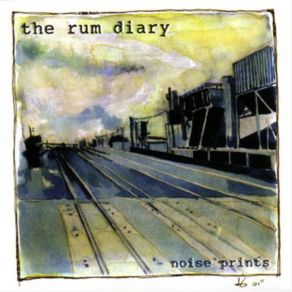Noise Prints
Download links and information about Noise Prints by The Rum Diary. This album was released in 2002 and it belongs to Rock, Indie Rock, Alternative genres. It contains 11 tracks with total duration of 01:04:22 minutes.

|
|
|---|---|
| Artist: | The Rum Diary |
| Release date: | 2002 |
| Genre: | Rock, Indie Rock, Alternative |
| Tracks: | 11 |
| Duration: | 01:04:22 |
| Buy it NOW at: | |
| Buy on iTunes $9.99 | |
Tracks
[Edit]| No. | Title | Length |
|---|---|---|
| 1. | Your Stylish Demise | 5:45 |
| 2. | Now Spears and Arrows | 3:04 |
| 3. | 1:38 am | 1:40 |
| 4. | The Sunken Fields | 10:05 |
| 5. | In Slow Transit | 6:24 |
| 6. | Stolen Lifts | 5:55 |
| 7. | Hathaway | 4:59 |
| 8. | Somerset | 5:23 |
| 9. | 1:38 pm | 1:40 |
| 10. | On Sunday | 5:07 |
| 11. | Helmet to Ecstatic | 14:20 |
Details
[Edit]Lane Brookshire's striking watercolor cover art comments eloquently on the Rum Diary's continually shifting, impressionistic post-rock: the album cover's representation of industrial gloom is offset by muted yellows overhead, while the interior artwork features an array of bright chartreuse swatches. The Northern California quartet's often-extended sonic explorations on their debut full-length, Noise Prints, are equally colorful, driven by dynamic arrangements and eclectic instrumentation the band itself describes in the album's credits as "too difficult to explain." From the sound of things, however, the Rum Diary's sonic ingredients include a pair of drummers, samples floating in and out of song mixes, hypnotically repetitive basslines, undulating guitar figures, spatial vocals, and a lifetime supply of timely distortion. The loping rhythms and multiple circular riffs of "Now Spears and Arrows" and "In Slow Transit" are welcome respites from the chaotic whirlpools of sound that punctures "The Sunken Fields," a mid-album epic bursting forth with slow-burning buildup, explosive crescendo, and post-apocalyptic shards of feedback. Further along, the comparatively playful "Stolen Lifts" lightens things somewhat before the closing grind-all, "Helmet to Ecstatic," leaves every preceding noise in a cloud of hazy particles. Music of this complexity and dynamism is clearly not for the faint of heart, and while Noise Prints' skyscraping wall of sound can appear frighteningly unscalable at times, there's always the safety net that comes with reverse-tracing its lineage of vertical-noise, from Three Mile Pilot through My Bloody Valentine's "Come in Alone," and finally back to Pink Floyd's "Interstellar Overdrive." Noise Prints places itself gracefully amidst Slint's creepiest moments and Mogwai's dreamiest ones. It somehow manages to sound unsettling, stunning, and original all at once.